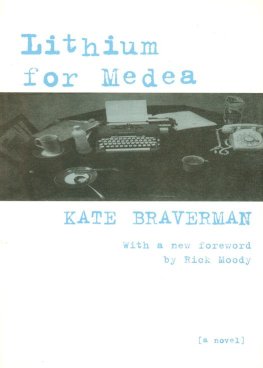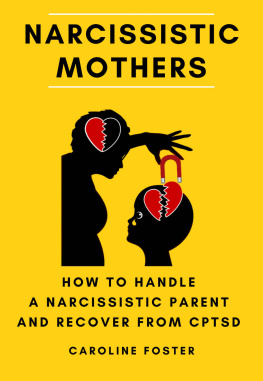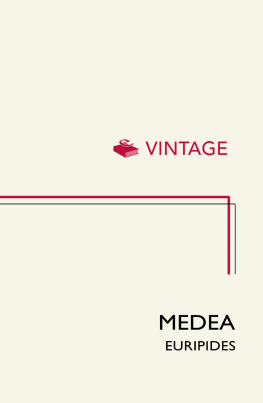Kate Braverman
Lithium for Medea
Some books are made for the young. They are not foreshortened to reach the young, nor made prurient with special attention to the habits and strategies of youth. But these books speak particularly well to how it feels to be young and to be faced with the imminent desperation of full-grown adulthood. Everyone has his own list of such works. Everyone has the books he or she first encountered like a victim of shipwreck coming across that buoyant hunk of driftwood. These reading experiences are delicious, essential, impossible to forget. I remember, in college, encountering Murphy by Samuel Beckett, in a freshman English class, and feeling like I had turned up a long-lost relative. Or first reading Sam Shepards plays, or first glimpsing the work of the Beats. Naked Lunch, Howl, and so on. The first novel I read by Thomas Pynchon, The Crying of Lot 49. James Thurbers stories. Dorothy Parker. Lydia Davis.
And heres another story. In 1987, I was working as an editorial assistant at Simon and Schuster, for an editor charged with making sure that the company kept a foothold in the literary fiction niche. I was a voracious reader of that particular shelf, the literary shelf, had even studied with a couple of this editors authors, who included at various points John Hawkes, Robert Coover, William Gaddis, Stanley Elkin, Toby Olson, and others. One day my boss handed me a manuscript and said, Im thinking of buying this and I want to know what you think. I chipped away at the manuscript for about a week or so, taking my time. It was one of the more difficult novels wed had around because it was motivated almost entirely by the sound of certain repeated words and images, and not much at all by story. In fact, it was comprised of four different stories, with different protagonists, all from Hispanic Los Angeles. It was a beautiful and overwhelming book, one forged in the wildfires of Los Angeles, and it was the second novel by Kate Braverman, the author of the book you are holding. I loved that novel, Palm Latitudes, a lot, and when we were getting ready to publish it, I did a lot of research on Braverman, which, because these were the days before the Web search, mainly amounted to reading a file of biographical material she had sent to her editor: a press packet about fifty pages deep, some of her poetry, and, as it turned out, a copy of her first novel, Lithium for Medea.
I was twenty-six. Kate must have been in her mid-thirties. I was about the age of the narrator of Lithium, who is mostly nameless in the book (except for an instant when she appropriates the name of her grandmother, Rose). While I loved Palm Latitudes, I was like a vessel waiting to have Bravermans first novel poured into my parched interior. Right from the first page, I knew I was in the presence of the kind of powerful, intuitive art that has always done the most to transport me,
I was running a bath. It was good to be liquid. I didnt have skin at all. I had the gleam of a fish, the fine etched scales and gills. I knew the soft channel down. I could burrow into the blue weight. I could wear whitecaps embossed across my back.
It was the time of Raymond Carver. The clean lines of the realistic short story held sway mostly, and anything that didnt adhere to that system of thinking was hard to parse, hard to fathom. But I liked work associated with emotional upheaval. I liked anything that grabbed the reader by the collar and demanded his or her attention. Lithium, with its ominous and decadent subject matter, had upheaval and desperation everywhere in it. Anywhere you opened the book there were sentences that disturbed, alarmed, impressed:
I wandered alone and practiced abandonment in parks of low drained hills.
Or:
Here the trail ends. After Death Valley and Donner Pass, there is only this last precarious oasis.
And the subject matter, it turned out, was as terrifying as the best sentences in the book. The unnamed protagonist (and narrator) struggled with her fathers recurrence of cancer and treatment thereof, while her pathologically narcissistic mother (excised whole, it seems, from Sunset Boulevard), alternately berated her and begged for her daughters pity. At home, meanwhile, the narrator was in the company of an intravenous drug addict of inconstant affections, who had also managed to addict her to cocaine. And this was the second in a series of poor romantic liaisons, since her ex-husband and first lover had been a psychotic, impotent Star Trek junkie. And so forth.
What Lithium for Medea is about, really, is irrelevant, though. Or at least its narrative sequence, which moves back and forth in time with such dizzying rapidity that it is sometimes difficult to remember what decade you are in, is irrelevant. In fact, the first time I read Lithium for Medea, I started from the back and moved forward, without, I think, losing the thread of the book at all. It was the mood of the work that seduced and enthralled, and when I later began to ponder the story itself, it was like doing the secondary work of dream interpretation. Bravermans success here, and it was her success in Palm Latitudes, too, and in her excellent poems, was and is the singularity of her voice. Hers is a language that proceeds entirely from the urgency of utterance, where poetic license is uppermost, where metaphor is everything, and where incident and the accumulation that goes with narrative are by-products, not ends in themselves.
A shell of a canoe and a shell of a gutted speedboat stretch out like lovers in the field where two canals meet. Broken stuffed chairs rot under the sun. Old screens with the wire mesh ripped lie in random stacks between houses. These are growing ruins. For decades the dirt has done as it pleases, pushing up what the winds brought, what a hand tossed.
Clearly this is a closely observed Venice, California, landscape, but can the dirt really do anything at all? The realist recoils from the imputation of motive to the inanimate and routine, yet in Bravermans heightened compositional awareness everything has motive. Everything is nomadic. Everything is mutable.
The method here comes after the Beats and is influenced by their wild freedom, that era which was coming to a close when Braverman was in college in California. But in the landscape of Lithium the Beats are merely a bend in the road. Much more potent as a point of origin is the distant revolution of surrealism, and its poetical adjuncts. Indeed, Andr Bretons Nadja is a good place to start for anyone who is trying to come to grips with the Kate Braverman who writes thus:
The night is a terrible season, even when it is wrapped in a luminous grayish fog thick as the breath of condemned men.
Heres Breton, e.g.:
Enter the spring. The spring has gone through the city looking for a bit of shade. She has not found what she needed, she complains as she tells us what she has seen.
Other voices from the ferment of the early part of the twentieth century are potent sources too, Artauds excess:
When you will have made him a body without organs then you will have delivered him from all his automatic reactions
and restored him to his true freedom.
Apollinaires austere and tranquil disorder:
The coals of the sky were so near that I was afraid of their heat.
Likewise, Lautreamont, Eluard, Huysmans, etc.
The difference you are bound to notice here is the femininity of the work. In both Palm Latitudes and Lithium, a matrilineal psychology is being mapped. In Lithium, its mapped not only in the adverse, in the poisonous monologues of the narrators mother, Francine:












